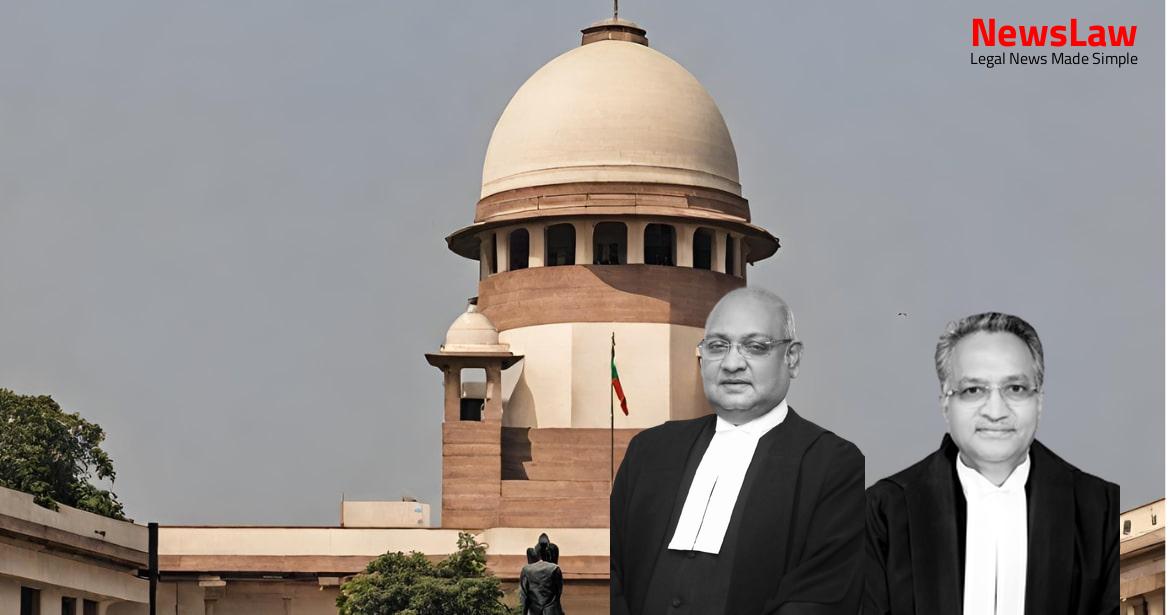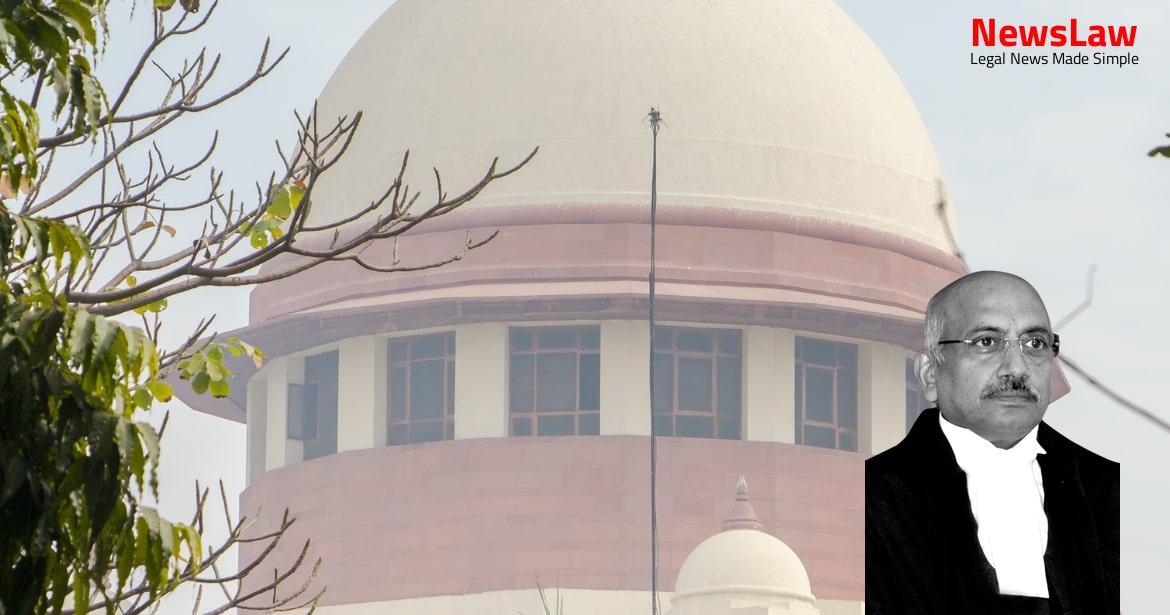In a significant ruling by the Supreme Court of India, the interpretation of Section 14 of the 2002 Act was deliberated, emphasizing the equivalence of Chief Judicial Magistrates and Chief Metropolitan Magistrates. This judgement holds profound implications for the efficient execution of debt recovery procedures, ensuring uniformity in legal proceedings. The decision also upholds the rights of borrowers, providing a statutory remedy of appeal against orders passed by the designated magistrates. This ruling represents a pivotal moment in advancing justice under the purview of the law.
Facts
- The powers and functions of CJM in non-metropolitan areas and CMM in metropolitan areas are the same.
- CMM exercises powers in metropolitan areas, while CJM exercises powers in non-metropolitan areas.
- The terms CJM and CMM are used interchangeably depending on the jurisdiction.
- In non-metropolitan areas, apart from the DM, the CJM is competent to exercise powers under Section 14 of the 2002 Act.
Also Read: Balancing Justice: Case Summary of C.P. No. 16/2017
Issue
- Whether the Chief Judicial Magistrate (CJM) can process the request of the secured creditor under Section 14 of the 2002 Act?
- Competence of the CJM in taking possession of the secured asset
- Interpretation of the provisions of the Securitisation and Reconstruction of Financial Assets and Enforcement of Security Interest Act, 2002
Also Read: Judgment by Supreme Court of India in M/s. Bhilwara Processors Ltd. vs. Department of Central Excise
Arguments
- Section 14 of the 2002 Act should be construed to include the office of CJM in a non-metropolitan area for advancing justice and legislative intent.
- The nature of inquiry under Section 14 is limited to verification of compliances by the secured creditor.
- Borrowers have a statutory remedy of appeal against orders passed by CJM, similar to CMM/DM.
- Contentious issues raised by borrowers can be equally dealt with by CJM as by CMM/DM.
- The jurisdiction and powers of CJM and CMM are essentially the same, barring territorial differences.
- CJM and CMM should be equated and placed in the same cadre of Civil Judge (Senior Division).
- The settled position of law has been interpreted based on a plain reading of the provisions.
- The contention of the learned counsel for the respondent that the decision of the Full Bench would be applicable prospectively has been rejected.
Also Read: Landmark Judgment: Consolidation of FIRs and Bail Granted in ‘Grand Venice’ Project Case
Analysis
- The 2002 Act allows for the application of provisions of the Cr.P.C. alongside its own provisions.
- Different High Courts have varied interpretations on whether the CJM can exercise powers under Section 14 of the 2002 Act.
- The High Court of Bombay and Madras held that only CMM in metropolitan areas and DM in non-metropolitan areas are competent to deal with applications under Section 14.
- Other High Courts like Kerala, Karnataka, Allahabad, and Andhra Pradesh took a liberal approach allowing CJM to exercise powers under Section 14.
- Some High Courts emphasized the need for a literal interpretation of the provisions of the 2002 Act.
- The authority referenced in Section 14 is meant to assist the secured creditor in taking possession, not to adjudicate on the rights of parties.
- Cases like Muhammed Ashraf and IndusInd Bank reflect differing interpretations on the scope of authority under Section 14.
- The analysis of the judgment revolves around the interpretation and application of Section 14 of the 2002 Act.
- The authority designated in Section 14 is primarily responsible for verifying specific factual assertions made in the application by the secured creditor.
- The inquiry conducted by the authority is administrative or executive in nature and does not involve adjudication of rights or liabilities of the contesting parties.
- The terms ‘CMM’ and ‘DM’ are not specifically defined in the 2002 Act, leading to a discussion on their interchangeable nature.
- Recommendations by the Shetty Commission regarding the role of Chief Metropolitan Magistrates and Chief Judicial Magistrates are scrutinized.
- The powers and functions of Chief Metropolitan Magistrates and District Magistrates are deemed similar under the Cr.P.C., contributing to the interpretation of Section 14.
- The High Court decisions related to the competency of CJM in non-metropolitan areas to handle applications under Section 14 are reviewed.
- Different High Courts’ views on the interpretation of Section 14 and the authority of CMM and CJM in executing administrative or executive functions are discussed.
- The application of the provisions of Cr.P.C. is considered in conjunction with the 2002 Act, emphasizing the non-adjudicatory nature of the inquiry specified in Section 14.
- A purposive interpretation is advocated to align the legislative intent of speedy debt recovery with the practical application of the law.
- Key High Court decisions (Kerala, Karnataka, Allahabad) are analyzed in relation to the delegation of powers and the inclusion of CJM as a competent authority under Section 14.
- The distinction between administrative and judicial functions is highlighted, emphasizing that the inquiry is limited to specified matters and does not involve judicial adjudication.
- The doctrine of prospective overruling is mentioned in light of varying High Court opinions on CJM competency under Section 14.
- An Assistant Commissioner appointed under sub-section (1) is empowered to exercise powers and perform duties under the Police Act or any other law in force.
- The power conferred on the authorised officer in Section 14 of the 2002 Act is in addition to, and not in derogation of, the Code of Criminal Procedure.
- The authorised officer’s power is limited to facilitating the takeover of secured assets using the State’s coercive power.
- Section 17 of the General Clauses Act allows for the substitution of functionaries like the Metropolitan Magistrate or District Magistrate to assist secured creditors in taking possession of secured assets.
- The term ‘Commissioner of Police’ includes an Assistant Commissioner as per sub-section (6) of the Police Act.
- An Assistant Commissioner appointed under the Police Act can exercise powers and perform duties as assigned by the Commissioner or as per the general or special orders of the State Government.
- The Assistant Commissioner could also perform functions assigned by the Commissioner under the general or special orders of the State Government.
- The CJM is considered equally competent to handle applications filed by secured creditors under Section 14 of the 2002 Act.
- No need to discuss other decisions related to statutory interpretation approaches.
- The CJM’s jurisdiction extends to applications under Section 14 of the 2002 Act.
Decision
- The High Courts of Kerala, Karnataka, Allahabad, and Andhra Pradesh approved the view taken regarding the costs, while the High Courts of Bombay, Calcutta, Madras, Madhya Pradesh, and Uttarakhand were reversed.
- The argument of prospective overruling by the secured creditors was not elaborated upon as it was unnecessary due to the decisions of the mentioned High Courts.
- The Civil Appeal from SLP (C) No.7121 of 2019 was against an interlocutory order, and it was disposed of with liberty for the parties to pursue the appeal pending before the High Court on other issues within the purview of the law.
- The decision in the pending appeal is to be made according to the law and based on its merits.
- No specific order was given in this regard, and pending applications in the respective appeals were also disposed of in the above terms.
Case Title: THE AUTHORIZED OFFICER,INDIAN BANK Vs. D. VISALAKSHI
Case Number: C.A. No.-006295-006295 / 2015



